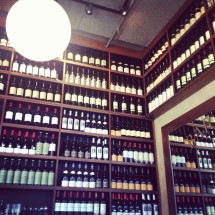Law Offices of John P. Connell, P.C.: When it comes to providing entertainment at bars and restaurants, a new form of entertainment is catching fire in and around Boston; so-called “Paint Nite” and other types of educational events that mix socialization, food, drinks and learning. “Paint Nite” in specific has become a very popular attraction for bars and restaurants: painting by instruction from an artist accompanied by food and drinks, creating a unique atmosphere for consumers. These types of instructional events, which could include art or cooking lessons, and endless more concepts, also allow consumers to sort through a variety of specialized themes in connection with their favorite venues.
During these types of events, wherein an independent artist or a chef, for example, provides a “show” of sorts, venues generate additional business; the artist or chef profits from teaching at events, as well as promoting themselves within the community; and event attendees come together with friends and strangers alike in a unique, creative and meaningful way that enhances the standard restaurant and bar experience.
Restaurants, however, should be aware that there are certain licensing issues that can come into play when trying to arrange such educational “entertainment” events. Pursuant to the Mayor’s Office of Consumer Affairs and Licensing, restaurants in Boston are required to obtain a Live Entertainment License for these types of events, as such events can constitute “entertainment” and therefore a restaurant’s standard non-live entertainment license, which may only cover televisions and piped-in music, do not authorize a venue to put on events wherein someone is hired by the venue to “perform” for its patrons. For venues that already do have an existing Live Entertainment license under M.G.L. Ch. 140 § 181, these entities would also need to make sure their Live Entertainment License either already includes these types of events or is amended to include these types of events.
These events are, generally speaking, referred to in M.G.L. Ch. 140 § 183A as a “public show” and when applying for “Live Entertainment” in Boston, there is a specific “floor show” box to be checked off when applying for the license. “Floor shows” traditionally referred to comedians, dancer performers and cabarets, but now an artist or chef running an “education” event may also be considered to be providing a “floor show.”
If the restaurant only desired to have these types of events occasionally and not throughout the year, it could apply separately for a One-Time Entertainment License, wherein the specific type of entertainment is listed. Pursuant to M.G.L. Ch. 140, Section 183A, these license requests are either granted within 45 days following receipt of application or provide the opportunity for a hearing on the application by written notice to the applicant, given seven days prior to the hearing.
Importantly, “Live Entertainment” license applications in Boston generally trigger a public hearing wherein the neighborhood may voice their support or opposition to such proposed entertainment, but with regard to events such as painting or cooking instruction, the Mayor’s Office of Consumer and Licensing Affairs retains discretion as to whether to have a hearing or not, so an apt description of the proposed activity is highly suggested. If a hearing is going to be required, it is important to consult with the local neighborhood groups to make sure their support is provided at the hearing.
Restaurants having this type of event shall also be mindful not have a cover fee that includes open bar or free drinks as part of the admission price, as that would constitute a “happy hour” violation for attendees if the event is open to the public and not invite only.
By Mandy Driscoll
© 2015 Law Offices of John P. Connell, P.C.

